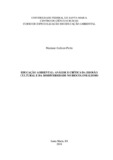| dc.contributor.advisor | Hillig, Clayton | |
| dc.creator | Perin, Mariane Gehlen | |
| dc.date.accessioned | 2018-04-04T12:08:35Z | |
| dc.date.available | 2018-04-04T12:08:35Z | |
| dc.date.issued | 2018-01-30 | |
| dc.date.submitted | 2018 | |
| dc.identifier.uri | http://repositorio.ufsm.br/handle/1/12856 | |
| dc.description | Monografia (especialização) - Universidade Federal de Santa Maria, Centro de Ciências Rurais, Curso de Especialização em Educação Ambiental, RS, 2018. | por |
| dc.description.abstract | This study investigates the relation of the current denial of the knowledge status of the
traditional knowledges, specifically, the traditional knowledges associated to biodiversity, the
modern paradigm, the anthropic global environmental crisis and the Integral Environmental
Education, critical and reflexive. This investigation is made from a bibliographic revision
about the Decolonial Sociology by Boaventura de Sousa e Santos and from the Critical
Theory. The methodology adopted by the world system, modern, western, capitalist – through
cientificism – denies the knowledge status of the traditional knowledges, which is a way of
subordinating or exterminating the people linked to them; as well as, dichotomize nature and
culture, which is put in a place of exteriority/inferiority. The denial of the cultural diversity
and the dichotomy culture/nature, which is in a place of inferiority, it is an inherently
colonialist attitude. Therefore, the alterity and the negative recognition of the Other is inherent
to the colonialism. Overcoming the erosion the culture and biodiversity is a problem
belonging in the whole of the global environmental crisis. It only can happen, if, in the other
hand of the modern colonial attitude, we establish relations of alterity and positive
recognition. Recognizing the diversity of knowledges in the world (epistemological plurality)
– through an “ecology of wisdoms” – the traditional societies and the nature. However, how
do we establish relations of alterity and positive recognitions of the modern culture‟s Other –
nature and traditional societies? On the adopted methodology, it can be done from an
Environmental Education. Fundamentally, in this sense, since critical, integral and reflexive,
far from the Ecologism. | eng |
| dc.language | por | por |
| dc.publisher | Universidade Federal de Santa Maria | por |
| dc.rights | Acesso Aberto | por |
| dc.rights | Attribution-NonCommercial-NoDerivatives 4.0 International | * |
| dc.rights.uri | http://creativecommons.org/licenses/by-nc-nd/4.0/ | * |
| dc.subject | Educação ambiental | por |
| dc.subject | Sociologia descolonial | por |
| dc.subject | Teoria crítica | por |
| dc.subject | Biocolonialismo | por |
| dc.subject | Environmental education | eng |
| dc.subject | Decolonial sociology | eng |
| dc.subject | Critical theory | eng |
| dc.subject | Biocolonialism | eng |
| dc.title | Educação ambiental: análise e crítica da erosão cultural e da biodiversidade no biocolonialismo | por |
| dc.title.alternative | Environmental education: analysis and criticism of cultural erosion and biodiversity in the biocolonialism | eng |
| dc.type | Trabalho de Conclusão de Curso de Especialização | por |
| dc.degree.local | Santa Maria, RS, Brasil | por |
| dc.degree.specialization | Educação Ambiental | por |
| dc.description.resumo | O presente trabalho investiga a relação da corrente negação do status de conhecimento aos
conhecimentos tradicionais, em específico, dos conhecimentos tradicionais associados à
biodiversidade, o paradigma moderno, a crise ambiental global antrópica e a Educação
Ambiental integral, crítica e reflexiva. Essa investigação é feita a partir de uma revisão
bibliográfica a partir da sociologia descolonial de Boaventura de Sousa Santos e da teoria
crítica. A partir da metodologia adotada o sistema-mundo moderno-ocidental-capitalista –
através do cientificismo – nega o status de conhecimento aos conhecimentos tradicionais, o
que é meio parar subalternizar ou liquidar povos ligados a eles; bem como dicotomiza cultura
e natureza, na qual a última fica no lugar da exterioridade/inferioridade. A negação da
diversidade cultural e a dicotomia cultura/natureza na qual a última ocupa lugar de
inferioridade é uma atitude inerente ao colonialismo; portanto, uma alteridade e
reconhecimento negativo do outro é inerente ao colonialismo. A superação da erosão cultural
e da biodiversidade – problemas pertencentes ao todo da crise ambiental global – só pode
ocorrer então se, ao contrário da atitude colonial moderna, estabelecermos relações de
alteridade e reconhecimento positivos, reconhecendo a diversidade de saberes do mundo
(pluralidade epistemológica) – através de uma “ecologia de saberes” -, as sociedades
tradicionais e a natureza. Mas como estabelecemos relações de alteridade e reconhecimento
positivo do outro da cultura moderna – natureza e sociedades tradicionais? A partir da
metodologia adotada isso pode ser feito a partir de uma Educação Ambiental é fundamental
neste caminho desde que crítica, integral e reflexiva, longe do ecologismo. | por |
| dc.publisher.country | Brasil | por |
| dc.publisher.initials | UFSM | por |
| dc.subject.cnpq | CNPQ::CIENCIAS HUMANAS::EDUCACAO | por |
| dc.publisher.unidade | Centro de Ciências Rurais | por |



